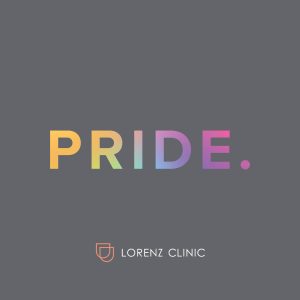PRIDE 2022 – Making Space
Written by Lorenz Clinic’s Social Equity Committee
Why pride?
The term pride comes from the sentiment behind this quote, “If the poison is shame, the antidote is pride” – Unknown
Pride History
The celebration of LGBTQIA+ pride began in New York City in June 1970 as protests in the street to commemorate the Stonewall Riots on its first anniversary. For decades since, communities in the US have gathered during the last weekend of June to honor and bring light to the resistance of advocates and agitators against a system of repeated oppression, humiliation, and dehumanization of LGBTQIA+ people.
Although Stonewall is often credited with beginning the gay rights movement, in reality, the uprising was the culmination of years of LGBTQIA+ oppression and resistance led by transgender, gender-nonconforming, and civil rights activists with long histories of involvement in concurrent Black and Latino liberation movements. Activists include: Sylvia Rivera, Marsha P. Johnson, Miss Major Griffin-Gracy, and Victoria Cruz just to name a few.
Pride Today
Today, Pride Month is more than a weekend to remember those who fought for survival and freedom. It is a whole month of events, activities, and parades to celebrate dignity, equality, increased visibility, and advancements in civil rights protections. It presents an opportunity, and perhaps an obligation, to rally around those who need support and assess the work that has yet to be done. It should be noted that while June is the month when pride is formally recognized, pride does not have to be exclusive to June, as social identities should be honored and celebrated all year long.
Mental Health Statistics for the LGBTQIA+ Community
Members of the LGBTQIA+ community experience higher rates of instances of mental illness.
The National Alliance of Mental Illness (NAMI, www.nami.org) highlights some staggering statistics:
- 86% of teenage youth who identify as LGBTQIA+ have been harassed or assaulted in their schools
- LGB people are 2x as likely to suffer from substance abuse; transgender people are 4x as likely when comparing to a heterosexual adult
- LGB high school-aged students are 4x as likely to attempt suicide compared to their heterosexual peers
- 40% of transgender adults have attempted suicide compared to 5% of the rest of the population
How Can Lorenz Clinic Help?
Lorenz Clinic is committed to providing an equitable and accessible space for all people from all walks of life. People do not need to struggle with a mental health crisis on their own, and Lorenz Clinic aims to be a source of support that people can trust. Further, Lorenz Clinic approaches patient care through systemic and relational lenses; thus, it is important to consider ways in which clients’ families and the larger systems in which they live impact their perceptions of support and access to mental health care.
The need for access to mental health resources has always been high for the LGBTQIA+ community. As has been noted throughout the coronavirus pandemic, mental health issues and saturation of the mental healthcare system have become significant concerns. Lorenz Clinic is here to make space and provide care to members of the communities which each clinic serves.
Making Space
- Recognize your responsibility to actively ensure that your space is accepting and affirming both as an organization and an individual provider. This includes reviewing your practices, policies, and paperwork for bias, ensuring all staff are trained and being proactive and consistent when communicating with youth and families about trust, confidentiality, and clients’ rights.
- Be mindful that clients are aware of the national conversations about access to care and the rights of LGBTQIA+ people, and acknowledge that any feelings or fears that arise from witnessing prejudice towards LGBTQIA+ people are valid. Be prepared to offer a space for them to process, ask questions, and plan for their safety.
- Create space for clients to explore the fullness of their gender and other cultural identities without fear of judgment or harm. Recognize how intersecting marginalized identities—including race, ethnicity, religion, ability, socioeconomic status, and mental health status—can reduce access and amplify the impact of rejection and fear of consequences for accessing gender-affirming care.
- Consider interventions that work. A practical intervention to help families presenting to Lorenz Clinic with a gender-expansive youth is to model and promote the use of the youth’s chosen name and/or pronouns. In a 2018 study, Russell and colleagues found that an increase by one context (e.g., home, school, friends, work) in which a gender-expansive youth’s chosen name could be used predicted a significant decrease in depressive symptoms (a 29% decrease in suicidal ideation and a 56% decrease in suicidal behavior).
Citations
Clarke, M., Farnan, A., Barba, A., Giovanni, K., Brymer, M. & Julian, J., (2022). Gender-affirming care is trauma-informed care. Los Angeles, CA, and Durham, NC: National Center for Child Traumatic Stress.
Russell, T., Pollitt, A., Li, G., Grossman, A. (2018). Chosen name use is linked to reduced depressive symptoms, suicidal ideation, and suicidal behavior among transgender youth. Journal of Adolescent Health, 63(4). https://doi.org/10.1016/j.jadohealt
About the Social Equity Committee
Founded in the summer of 2020, the mission of the Social Equity Committee is to identify systemic oppression that may be present within the mental health profession and to dismantle any oppression within the Clinic. The committee is comprised of Dr. Morgan Bobo, Outpatient Psychotherapy (Chair), Emily Ertel, Human Resources, Travis Grundy, Business Operations, Danielle Kuka, Outpatient Psychotherapy, BJ Suarez, Training, and Ashley Utz, Outpatient Psychotherapy.